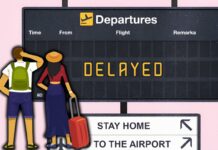In the realm of air travel, a clandestine practice known as “skiplagging” or “hidden-city travel” has been gaining traction among budget-conscious flyers. This strategy involves booking a ticket for a multi-leg flight but intentionally disembarking at the layover city, often saving travellers a significant amount of money.
While airlines strictly prohibit this tactic, it continues to attract attention as a means of obtaining flight bargains.
Unearthing The Strategy Behind Skiplagging
Skiplagging takes advantage of the intricate pricing dynamics that influence airline ticket costs. Unlike conventional assumptions based on travel distance, flight prices are shaped by a multitude of factors, including energy prices, demand for specific routes, and competition among airlines.
This unique pricing landscape opens the door for savvy travellers to exploit loopholes by booking connecting flights with layovers in their desired destinations. By disembarking after the initial leg of the journey, passengers can often secure lower fares compared to direct flights.
Online platforms like Skiplagged and Kiwi have emerged to aid them by unearthing and booking these hidden-city deals. However, the success of skiplagging hinges on staying under the radar, as airlines are vigilant in enforcing their contracts of carriage.
Also Read: What Went Behind In London For Air India’s Multi-Dollar Airplane Deal?
The Rising Appeal Amidst Soaring Airfare Costs
Escalating airfare prices in recent years have contributed to the allure of skiplagging. With added fees for various amenities and services, travelers find themselves drawn to cost-saving strategies like hidden-city travel.
While travel experts may not endorse this approach, the motivation behind it is clear – the desire to offset the financial burden of expensive airline tickets. The founder of Skiplagged, Aktarer Zaman, highlights that his platform empowers individuals to challenge what he describes as “price gouging” by traditional airlines.
Despite the ethical debate, the attractiveness of substantial savings continues to drive the popularity of skiplagging.
A Complex Ethical Quandary And Ongoing Legal Battles
The practice of skiplagging presents a complex ethical dilemma for both travelers and airlines. While it may seem like a clever cost-saving measure, airlines view it as a violation of their contracts of carriage.
Consequences for skiplagging can range from revoked frequent flyer miles to potential legal action. Airlines argue that the exploitation of hidden-city fares leads to missed revenue opportunities and disrupts flight operations.
However, critics contend that these fares expose a flaw in airline pricing strategies and highlight the disparity in costs between different routes. Legal battles between airlines and online providers like Skiplagged have ensued, but the outcome remains uncertain, leaving the door open for continued debate and exploration of this contentious travel tactic.
In the realm of air travel, skiplagging stands as a controversial yet alluring approach to navigating the rising costs of airline tickets. This strategy, fueled by the intricate pricing mechanisms of the industry, empowers travelers to seek unconventional ways of saving money.
While airlines fiercely oppose this tactic, travelers continue to explore the boundaries of airline contracts and pricing models.
The ongoing ethical debate and legal battles surrounding skiplagging underscore the complex relationship between the travellers and the aviation industry, raising questions about fairness, accountability, and the future of budget-friendly air travel.
Image Credits: Google Images
Feature Image designed by Saudamini Seth
Sources: New York Times, Times Of India, Washington Post
Find the blogger: Katyayani Joshi
This post is tagged under: airline, skiplagging, controversy, controversial, budget, Skiplagged, Kiwi, flyer miles, aviation, revenue, tactic, strategy, travel tactic, tickets, layover city, hidden city travel
Disclaimer: We do not hold any right, or copyright over any of the images used, these have been taken from Google. In case of credits or removal, the owner may kindly mail us.




































